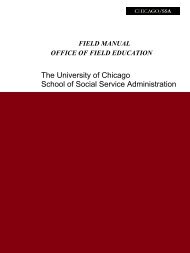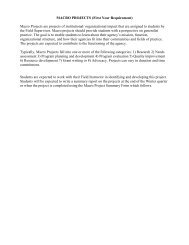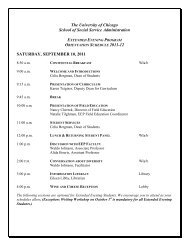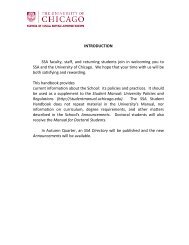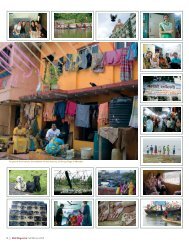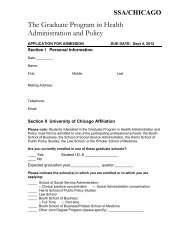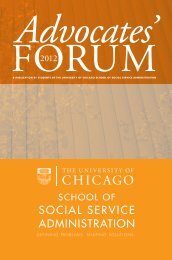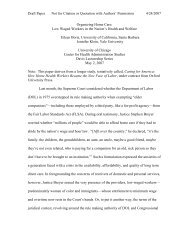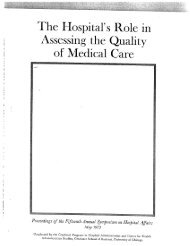2004 - School of Social Service Administration - University of Chicago
2004 - School of Social Service Administration - University of Chicago
2004 - School of Social Service Administration - University of Chicago
You also want an ePaper? Increase the reach of your titles
YUMPU automatically turns print PDFs into web optimized ePapers that Google loves.
CHILDREN AND INCARCERATION<br />
APPLICATION OF SYSTEMS THEORY<br />
The systems theory conceptualizes the importance that factors, such as family,<br />
community, school, or society, can play in the development <strong>of</strong> the individual<br />
and his or her consequent life activities (Newman and Newman, 2003). “The<br />
system can not be wholly understood by identifying each <strong>of</strong> its component<br />
parts... the relationships <strong>of</strong> those parts make for a larger coherent entity”<br />
(Newman and Newman, 2003, p. 84). Through an application <strong>of</strong> systems<br />
theory to the life circumstances <strong>of</strong> Joyce Dixson and her sons, it is possible to<br />
clearly demonstrate the role that the environment plays in shaping a child’s<br />
ability to cope.<br />
In 2001, Joyce Dixson, founder and director <strong>of</strong> Sons and Daughters <strong>of</strong><br />
the Incarcerated (SADOI) gave a personal account <strong>of</strong> the hardships resulting<br />
from her incarceration (Joyce Dixson, personal communication, March 9,<br />
2001). In August <strong>of</strong> 1976, Ms. Dixson was convicted <strong>of</strong> killing her husband<br />
and imprisoned for 17 years. Ms. Dixson described her husband as the sort <strong>of</strong><br />
person who could “beat up old people and sell drugs to young kids” (personal<br />
communication, March 9, 2001). While in prison, Dixson focused her energies<br />
on acquiring an education and transforming her life. She became the first<br />
incarcerated woman to earn a bachelor’s degree from the <strong>University</strong> <strong>of</strong><br />
Michigan. After receiving this degree and enduring 17 years <strong>of</strong> arduous struggles<br />
with legal appeals and letter-writing campaigns, an appellate court overturned<br />
her conviction. But for Ms. Dixson, the victory was bittersweet: her<br />
two sons, who did not have any contact with her while she was in prison, were<br />
grown. The two young boys whom she left at 6 and 12 years <strong>of</strong> age were now<br />
23 and 29 years old. The traumatic experiences endured during their mother’s<br />
incarceration were a direct result <strong>of</strong> the separation (personal communication,<br />
March 9, 2001).<br />
“Children who played with my kids previous to my incarceration, no<br />
longer wanted to be bothered with them,” said Dixson (personal communication,<br />
March 9, 2001). Neighbors ceased to welcome the children <strong>of</strong> a “prison<br />
mommy” into their homes (personal communication, March 9, 2001). In<br />
essence, the children were ostracized from their community and were made to<br />
feel like criminals themselves. This ostracism was also evident at school. Ms.<br />
Dixson was constantly informed that her older son frequently fought other<br />
children in the streets and on school grounds. Classmates excluded her sons<br />
from participating in a variety <strong>of</strong> activities, including eating together at lunch<br />
and involvement in group activities (Joyce Dixson, personal communication,<br />
March 9, 2001).<br />
55



